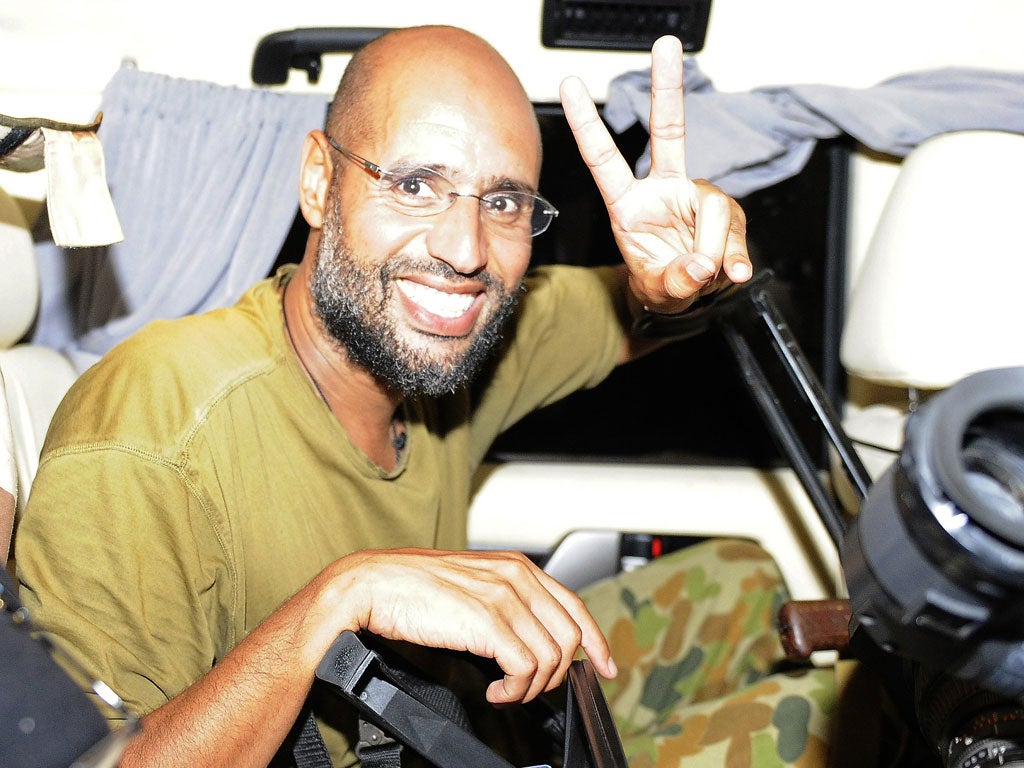Fearful Saif takes the first step in turning himself in
Gaddafi's best-known son has been having 'informal conversations' with ICC prosecutors

Your support helps us to tell the story
From reproductive rights to climate change to Big Tech, The Independent is on the ground when the story is developing. Whether it's investigating the financials of Elon Musk's pro-Trump PAC or producing our latest documentary, 'The A Word', which shines a light on the American women fighting for reproductive rights, we know how important it is to parse out the facts from the messaging.
At such a critical moment in US history, we need reporters on the ground. Your donation allows us to keep sending journalists to speak to both sides of the story.
The Independent is trusted by Americans across the entire political spectrum. And unlike many other quality news outlets, we choose not to lock Americans out of our reporting and analysis with paywalls. We believe quality journalism should be available to everyone, paid for by those who can afford it.
Your support makes all the difference.The prospect of Muammar Gaddafi's best-known son facing trial in The Hague for crimes against humanity suddenly increased last night with the revelation that he had been in touch with the International Criminal Court.
The ICC's chief prosecutor, Luis Moreno Ocampo, revealed there had been "informal conversations" with Saif al-Islam Gaddafi, who has been on the run since the Libyan regime fell in August, and whose father was killed last week, apparently trying to leave his home town of Sirte.
Abdel Majid Mlegta, a senior military official of Libya's National Transitional Council, said this week that Saif al-Islam and Abdullah al-Senussi, Muammar Gaddafi's former security chief and brother-in-law, wanted to surrender to the ICC because they felt unsafe. Both men are wanted in connection with the bombing and shooting of protesters when the revolt against the regime began in February.
There is no certainty about Saif al-Islam's whereabouts or condition, with conflicting reports that he is in Niger, Algeria or still in Libya and may be wounded. But an NTC source said that he wanted an aircraft to airlift him into ICC custody from the southern Libya desert.
Mr Ocampo said yesterday: "They are informal conversations. I think they are exploring the possibility to appear before the court... and if he considers himself innocent, he has the right to present this argument before the judges."
He added that once the court had received formal certification that Muammar Gaddafi was dead, the case against the dictator would be closed. But he said the case against Saif al-Islam and Mr al-Senussi was pressing because of evidence against them, including that "Saif was critically important in organising the killings of civilians in Libya".
Mr Ocampo said that if Saif was still in Libya, he could surrender to the interim government there. There were fears, however, that Saif al-Islam may be weighing up whether to flee to a friendly country which would not cooperate with the court. "We know he has a different option because apparently there is a group of mercenaries willing to move him to a country, probably Zimbabwe," Mr Ocampo said.
Amnesty International last night said the NTC had an obligation to ensure both Saif al-Islam and Mr al-Sanussi did not meet the same fate as the former's father and his brother Mutassim and should be allowed to stand trial at the ICC. Marek Marczynski, an Amnesty spokesman, said: "Investigating the men before the ICC offers an opportunity to ensure justice, truth and reparation for the victims of the crimes against humanity they are charged with committing against the Libyan people – justice that may have been denied if the unlawful killing of Colonel Muammar Gaddafi is confirmed."
The African Union has criticised the ICC's preoccupation with Africa and has opposed the arrest warrant for President Omar Al-Bashir of Sudan, who has visited ICC member states, including Chad, without being arrested.
If Saif al-Islam does end up in the Hague, a public trial could be potentially embarrassing for European politicians, including members of Britain's previous Labour government. He could detail his contacts with the West during the period of rapprochement with the Gaddafi regime.
After Libya took responsibility for the Lockerbie bombing, renounced terrorism and ended its nuclear weapons programme, Saif al-Islam was viewed by some Western leaders as Libya's main hope for political and human rights reforms.
Subscribe to Independent Premium to bookmark this article
Want to bookmark your favourite articles and stories to read or reference later? Start your Independent Premium subscription today.
Join our commenting forum
Join thought-provoking conversations, follow other Independent readers and see their replies
Comments